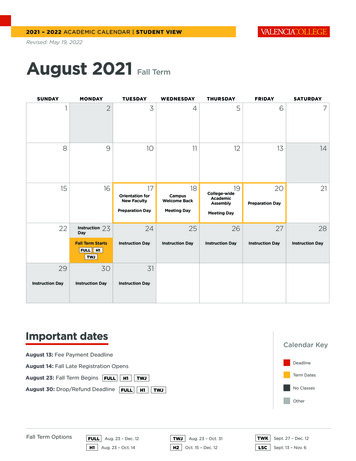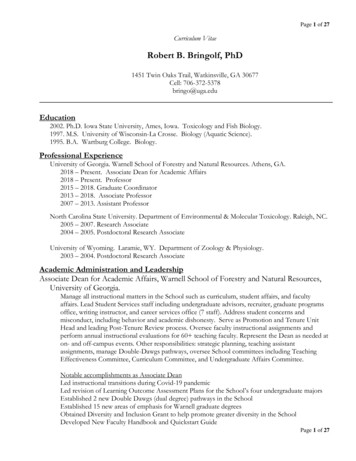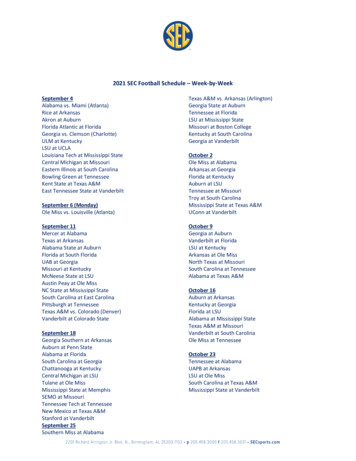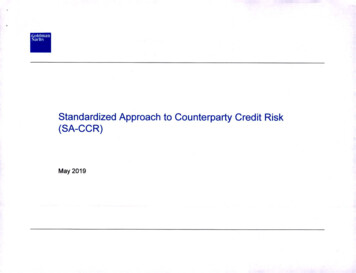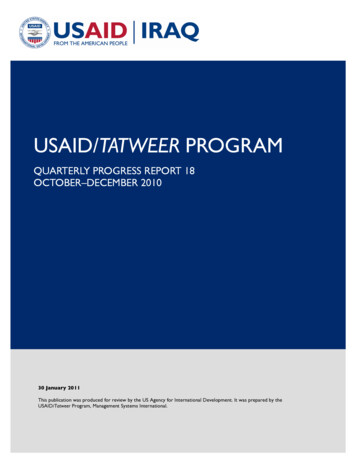
Transcription
USAID/TATWEER PROGRAMQUARTERLY PROGRESS REPORT 18OCTOBER–DECEMBER 201030 January 2011This publication was produced for review by the US Agency for International Development. It was prepared by theUSAID/Tatweer Program, Management Systems International.
USAID/TATWEER PROGRAMQUARTERLY PROGRESS REPORT 18OCTOBER–DECEMBER 2010Contracted under DFD-I-00-05-00221-01National Capacity Development ProgramJanuary 30, 2011Please do not circulate this report without due consideration of security issues in Iraq.DISCLAIMERThe author’s views expressed in this publication do not necessarily reflect the views of the US Agency for International Developmentor the United States Government.
CONTENTSProgram Overview. 1I. Program Highlights . 2A. Summary Highlights .2B. Strengthening Key Ministries .3Ministry of Agriculture (MoA) .3Ministry of Education (MoED) .5Ministry of Electricity (MoE).7Ministry of Health (MoH). 10Ministry of Municipalities and Public Works (MoMPW) . 12Ministry of Planning (MoP). 13Ministry of Planning – Kurdistan Regional Government (MoP-KRG). 18Ministry of Oil (MoO). 20C. Strengthening Executive Offices . 24Presidency Council (PC) . 24Prime Minister’s Office (PMO) . 24Deputy Prime Minister’s Office – Economic Affairs (DPMO–EA) . 26Deputy Prime Minister’s Office – Services (DPMO–S). 27D. Cross-Cutting Technical Assistance . 28Civil Service Reform (CSR) . 28Social Safety Net (SSN) . 29USAID/Tatweer Scholarship Program . 31E. Training Update. 33II. Program Management. 37Personnel. 37Administration. 38Project Management Systems and Procurement. 38Facilities, Systems, and Equipment. 38Security and Transportation . 38Annex 1: Performance Indicators at a Glance. 39Output Indicators: . 39Project Result 1: Strengthened Core Public Administration Skills . 44Project Result 2: Ministries Establish More Effective Administrative Systems . 46Project Result 3: Public Administration Training Capacity Expanded . 47Quarterly Progress ReportOctober–December 2010i
ofPartyMoP- ationalSelf- logyTMStrainingmanagementsystemsQuarterly Progress ReportOctober–December 2010ii
ationToTTrainingofTrainersQuarterly Progress ReportOctober–December 2010iii
PROGRAM OVERVIEWThe USAID-funded Tatweer program is a leading component of the U.S. Government’s National CapacityDevelopment program in Iraq. USAID/Tatweer focuses on “developing national capacity in public management,” toimprove key ministries’ core management systems, raise the skill levels of a critical mass of public managers, andrevive the government’s training institutions’ capacity. USAID/Tatweer works to improve six core areas of publicadministration: fiscal management, human resources management, project management, leadership andcommunication, strategic planning, and information technology.Participating Ministries and Executive Offices: USAID/Tatweer teams work directly with key national ministriesand offices to introduce improved management systems and capabilities. Participating ministries and executiveoffices are as follows: the Ministries of Planning, Electricity, Oil, Agriculture, Water Resources, Municipalities andPublic Works, Health, Education, Human Rights, and Migration and Displaced; and the executive offices of thePresident and Vice Presidents, the Prime Minister and Deputy Prime Ministers, and the Council of MinistersSecretariat.Civil Service Reform: A keystone to improving public management is a fully functioning set of civil serviceinstitutions that stress merit, equality of access, transparency of hiring and promotion, and fair and competitivecompensation. USAID/Tatweer assists the government of Iraq in drafting civil service legislation to re-establish aCivil Service Commission and update its civil service law. USAID/Tatweer advisors assist in the institutionaldevelopment of the new Civil Service Commission and in the reorganization government agencies’ human resourcesmanagement departments to address the requirements of a modern civil service.Provincial Outreach: In addition to working with the ministries’ central offices, USAID/Tatweer providesassistance to the provincial offices of the national ministries. This provincial work is facilitated by the program’soffices in Erbil, Mosul, Hilla, Ramadi, Kirkuk, and Basrah. USAID/Tatweer international and Iraqi advisors providedirect mentoring workshops and technical assistance in systems improvements to provincial offices, includinghands-on case work with existing projects. In addition to the technical assistance activities, over 75% of allUSAID/Tatweer trainees are civil servants working in their ministries’ provincial offices. USAID/Tatweer coordinatesits work in the provinces with the Provincial Reconstruction Teams (PRTs), the U.S. Military, and other USAIDimplementing partners.Training and Scholarship Program: USAID/Tatweer provides training to raise the skill levels of a critical mass ofcivil servants. At the end of December 2010, the program had enrolled over 105,179 trainees in over 5,352 courseson core public administration topics including budgeting, procurement, project management, human resourcesmanagement, information technology, ethics and anti-corruption, strategic planning, and leadership andcommunication. All training is competence-based, geared towards practical skills, adult learner-centric and in Arabic.Additionally, USAID/Tatweer provides international post-graduate scholarships—Masters in Public Administrationand Public Policy—for over 100 scholars drawn from the civil service ranks and the private sector.Strengthening Government’s Training Institutions: USAID/Tatweer is committed to anchoring the trainingcapacity in Iraqi institutions. USAID/Tatweer coordinates with the NCCMD, the Al Quds School of Computers, theKRG Ministry of Planning, Salah ad Din University, and ministerial training centers, to develop and sustain a vibrantpublic administration training capacity throughout the country. USAID/Tatweer’s training program began with directtraining courses developed and delivered by international advisors who then developed a cadre of civil servantsthrough a rigorous “training of trainers” program to take over the training delivery in their ministries. Nearly 900 ofthese government trainers now deliver 90% of USAID/Tatweer’s basic training in public management skills. Partnerministries are assuming the costs and implementation of training delivery, adapting USAID/Tatweer trainingmanagement systems and adopting USAID/Tatweer training materials in public administration.Quarterly Progress ReportOctober–December 20101
I. PROGRAM HIGHLIGHTSA. SUMMARY HIGHLIGHTS The Ministry of Health issued a ministerial decree to create a three unit Planning and Curriculum DevelopmentSection at the Human Resources Training and Development Center (HRTDC). During 2010, USAID/Tatweerconducted several workshops and trained 30 Master Trainers in curriculum development. As part of the training,the teams developed eight training manuals in different subjects such as change management, feasibility studies,monitoring and evaluation, and law and ethics of public work, among others. The HRTDC will be using thismaterial as part of their training package. In addition, the Parliament and Council of Ministers approved changesto Health Laws, which included the transformation of the HRTDC into a Training Center at a directorate level,with its own budget that will be included in the Ministry’s general budget. The Ministry also allocated funds torehabilitate, furnish, and equip a separate building to serve as a national and regional training center with ahospitality residence. Following the success of USAID/Tatweer’s procurement training activities with the Ministry of Municipalities andPublic Works (MoMPW) in Kirkuk, Baghdad, Babil, Najaf, and Basrah, the program conducted additionalworkshops and coaching in the remaining nine provinces. The majority of this training was done at the request ofdifferent MoMPW directorates, and was held on a smaller scale than the previous series of USAID/Tatweerworkshops. A number of the workshops were held for staff of the Governors’ offices of Babil, Muthanna, andBasrah at the express request of the respective provincial Governors. MoMPW directorates in each provincepassed these requests on to USAID/Tatweer, and coordinated the training workshops for the Governor’s office ineach province. USAID/Tatweer completed, published, and distributed the English translation of the National Development Plan2010-2014 (NDP). USAID/Tatweer also assisted the Ministry of Planning (MoP) with the big challenge followingthe NDP’s release in July: to finalize a draft of the National Monitoring Framework that will be implemented totrack progress and impact of the plan. USAID/Tatweer worked extensively with the MoP’s follow up unit to createthe framework, and conducted a second NDP Monitoring and Evaluation Framework conference in Octoberwhich was targeted at provincial GoI ministries and agencies. Sessions included a review of objectives andindicators that are aligned with the NDP and discussions about the importance of data quality and datadocumentation. The draft National Monitoring Framework was finalized over the following weeks, and now ismade up of a detailed list of objectives and over 500 indicators that will be addressed on an incremental basis. USAID/Tatweer’s ongoing assistance to the Central Organization for Standardization and Quality Control(COSQC) to facilitate the selection of international firms to conduct import inspections for products enteringIraq bore fruit at the end of this quarter. USAID/Tatweer worked closely with COSQC for over a year in theorganization’s efforts to identify, short-list, select, and ultimately contract international import inspection firms.On December 24, 2010, COSQC’s President signed contracts with two international inspection companies forprivate inspection and certification of imports into Iraq. Both of these firms are highly respected andinternationally recognized, with certified testing and inspection laboratories present in the various countriesexporting to Iraq. USAID/Tatweer made a presentation on USAID civil service reform in Iraq at the Arab League First Conferenceon Human Resources Management in the Public Sector held in Cairo, Egypt and sponsored by the Arab league.The presentation contained a brief background on USAID, USAID humanitarian action and assistancethroughout the world, and an overview of the technical assistance provided to different countries including Iraq.This presentation represents the first opportunity for USAID to address issues regarding assistance to Iraq, andwas well received by the Arab League. The Iraqi delegation was particularly pleased with the emphasis onUSAID/Tatweer’s partnership with the GoI, and the GoI’s ownership of its civil service reform efforts.Quarterly Progress ReportOctober–December 20102
B. STRENGTHENING KEY MINISTRIESMINISTRY OF AGRICULTURE (MOA)CENTRAL MINISTRY HIGHLIGHTSAlthough activity with MoA slowed somewhat during the quarter as the project began winding down its operations,Ministry of Agriculture leadership continued to show a great deal of interest in USAID/Tatweer interventions,particularly in agricultural policy development, training management systems (TMS), IT management, andperformance enhancing activities such as feasibility studies and business process analysis. USAID/Tatweer, inresponse to requests from the MoA, installed the Animal Health Database (AHDB) at a number of animal hospitalsand state agricultural companies in Baghdad and the provinces, as well as an inventory management database atseveral of the same facilities.In November, the ministry hosted a special ceremony to celebrate USAID/Tatweer’s achievements and collaborationwith the ministry. The event was attended by the Minister of Agriculture and top MoA management, as well as theMission Director of USAID/Iraq, the Deputy Chief of Mission from the US Embassy, and USAID/Tatweerleadership. A report of the event was published in Al Sabah newspaper. During the celebration, the Minister statedin his remarks that USAID/Tatweer has been instrumental in developing the ministry’s public management capacitywhich has in turn improved its performance and output.PROVINCIAL ACTIVITY HIGHLIGHTSUSAID/Tatweer continued to provide problem solving, decision-making, budgeting and auditing, and governmentcommunication and planning workshops to provincial planners, project managers, and veterinarians during thisquarter. These programs were well received, which led to a number of requests for additional workshops andtechnical assistance in other areas, including GIS and IT management. USAID/Tatweer responded by working withmanagement and staff of provincial directorates and animal clinics to provide and install Oracle databases to trackand report on animal disease, to complete inventory surveys, and to aid in informed planning and decision-making.Table 1: MoA Reporting xpectedResultsDecember2010ActualResultsSub- ectiveAdministrativeSystemsSub- ncial)Quarterly Progress ReportOctober–December icplanningFive- (ICT)StrategicPlandocumentAchieved:5- eadership.ThreeStateCompaniesapprovedthe5- adwithdatabaseinstalled3
abil,Basrah,andprovincialofficesKirkukProblem- ‐solvinganddecision- dproblem- :78MoAprovincialseniorsmentoredonproblem- ‐solving,time- ‐managementanddecision- ‐makingContinuedevelopmentoften- triesandexecutiveofficeswithinstitutionalizedself- ployedinthree[Cumulative]provincesSub- ngCapacityExpandedSub- thenewMoAMinisterQuarterly Progress ReportOctober–December 20104
CONTEXT AND OBSTACLES ENCOUNTEREDAlthough the security situation and the lack of a constituted government caused some impact in USAID/Tatweer’sinteractions with the MoA, the excellent working relationship and collaboration that had been established over thelife of the program ensured that USAID/Tatweer activities continued to have an impact throughout the ministry. Inparticular, this partnership worked well during the creation and installation of the ADHB and the transfer ofOrganizational Self-Assessment and Transformation (OSTP) activities fully into MoA control.MINISTRY OF EDUCATION (MOED)CENTRAL MINISTRY HIGHLIGHTSAlthough USAID/Tatweer’s work with the Ministry of Education has only been actively underway for a year, theMoED has been taking advantage of the program’s training opportunities and technical assistance. In particular,USAID/Tatweer delivered a variety of training courses and workshops to MoED staff, including a number of ITmanagement, networking, and software application courses designed for IT managers and specialists. In addition,USAID/Tatweer delivered project management and procurement training to MoED staff from the FiscalManagement, Legal, and Contracts offices, and strengthened the MoED’s sustainable training capacity by providingTraining of Trainers (ToT) courses.PROVINCIAL ACTIVITY HIGHLIGHTSUSAID/Tatweer provided a number of training courses, special workshops, and technical assistance to MoED staffin Karbala, Ninawa, Basrah, Diyala, Diwaniyah, and Kirkuk. These sessions included training in leadership andcommunication, financial management, and procurement, as well as ToT courses for nearly 50 MoED staff in Babil.Table 2: MoED Reporting xpectedResultsDecember2010ActualResultsSub- ectiveAdministrativeSystemsSub- ingcentersQuarterly Progress ReportOctober–December nctioningin3provinces,5
ionalizedself- ofOSTPpresentationsprovided.Sub- ngCapacityExpandedSub- i- ngalreadyconductedatmid- y.Quarterly Progress ReportOctober–December 20106
dResultsDecember2010ActualResultsAnti- ‐corruptionTrainingConductfivethree- ‐dayanti- ‐corruptionworkshopsforMoEDpersonnelAchieved:75
Quarterly Progress Report 1 October-December 2010 PROGRAM OVERVIEW The USAID-funded Tatweer program is a leading component of the U.S. Government's National Capacity Development program in Iraq. USAID/Tatweer focuses on "developing national capacity in public management," to improve key ministries' core management systems, raise the skill levels of a critical mass of public managers, and




